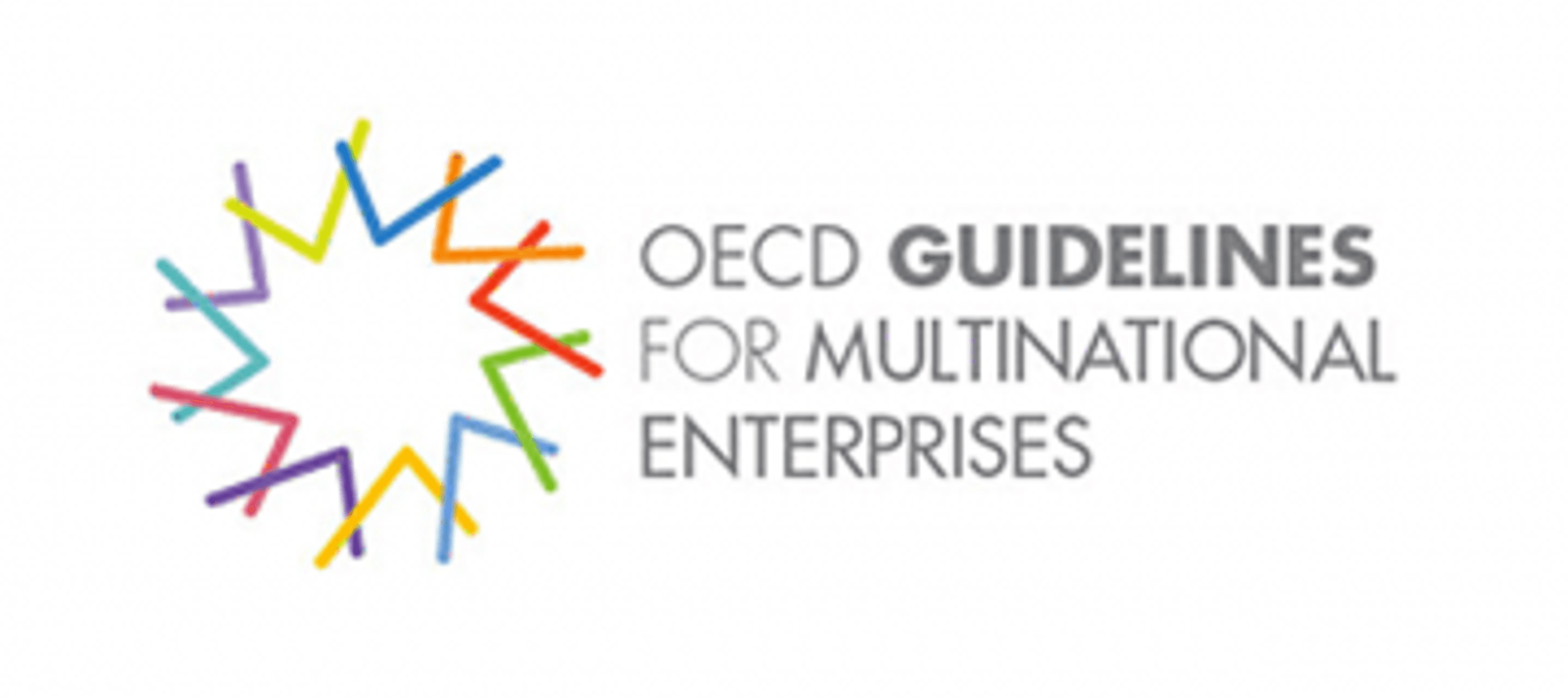OECD’s Human Rights Grievance Mechanism as a Competitive Advantage
4 November 2014

The link between the National Action Plans for Business and Human Rights and the OECD Guidelines
Currently the UN Working Group is seeking consultation on what substantive elements should be included in National Action Plans (NAPs) for business and human rights. NAPs are strategy documents that States are encouraged to develop as part of the State responsibility to disseminate and implement the UN Guiding Principles on Business and Human Rights (UNGPs).[1]
Several states have already developed and submitted NAPs. While such plans will vary according to specific state contexts, some overview of the elements that should be covered within the plans will be helpful in achieving coherence on principles for strengthening implementation of the UNGPs.
UN Guiding Principles for Business and Human Rights, OECD Guidelines for Multinational Enterprises and National Contact Points
The 2011 update of the OECD Guidelines for Multinational Enterprises (‘the Guidelines) included a stronger human rights chapter fully aligned with the UNGPs. Countries adhering to the Guidelines, currently comprising 46 nations, are required to set up National Contact Points (NCPs). The role of NCPs is to raise awareness on expectations covered under the Guidelines and to serve as good offices for resolution of issues, or ‘’specific instances’’, arising from the alleged non-observance of the Guidelines. Thus, through the vehicle of NCPs, the Guidelines are a de facto implementation mechanism of the UNGPs. Since 2011 the chapter on human rights of the Guidelines has been cited in 54 specific instances brought to NCPs and has been the most frequently cited chapter of the Guidelines over the last two reporting periods.[2] As such NCPs should be a principle component of NAPs.
NCPs are also valuable in that they can provide guidance on related OECD tools which promote human rights, for example the OECD Due Diligence Guidance for Responsible Mineral Supply Chains, which aims to end the financial and commercial support of armed groups and militias and stop the most egregious human rights abuses associated with mining in high-risk and conflict-affected areas. Where relevant, these types of tools should likewise be incorporated into NAPs and can be reinforced by NCP mechanisms.
National Contact Points: an effective and non-adversarial platform for dialogue
The NCP mechanism has a growing track record of agreements resulting through mediation. Just recently the UK NCP resolved a complaint brought by the World Wildlife Fund based on the activities of Soco, an oil exploration company, in Virunga National Park, a World Heritage Site located in the Democratic Republic of the Congo. With respect to human rights the NCP recommended dialogue on whether the level of Soco’s human rights due diligence was appropriate to the context of the DRC. The mediation resulted in agreement amongst the two parties including agreement by Soco to cease its operations, to never again jeopardize the value of any other World Heritage Site and to conduct environmental impact assessments and human rights due diligence in line with international standards.[3]
The Soco case is just one of many examples of the added value NCP procedures could have in the area of human rights and business. As a non-judicial mechanism the NCP mechanism provides a unique venue for resolution of issues related to human rights and business. This mechanism not only contributes to strengthening implementation of the UNGPs, specifically through providing access to remedy, but also serves as a useful tool for businesses themselves. Specific instances brought for mediation to NCPs are not legal procedures; likewise NCPs are not legal authorities, or a ‘CSR court’. Utilizing the NCP mechanism provides a venue for enterprises to discuss and explore issues regarding responsible business conduct in a low-cost, non-adversarial manner, which can avoid further escalation of disputes.
Many companies are still somewhat wary of the NCP procedure. Their hesitance reminds me of former US President Ronald Reagan’s famous quote: “The most terrifying words in the English language are: ‘’I am from the government and I am here to help”. On the other hand, a growing number of companies appreciate the assistance NCP’s can provide. [4]
Furthermore avoiding NCP procedures by refusing to come to the table can be harmful to a business. A refusal to cooperate will not make existing issues or campaigns disappear, rather it can harm relationships between the company and parties seeking mediation and result in a lost opportunity to discuss disagreements in a neutral and proactive environment. Thus, businesses should take advantage of the good offices of NCPs and engage in mediation when issues arise. Experience shows that a problem solving approach to conflict works much better than a legalistic and defensive approach; when it comes to dispute resolution private sector representatives have communicated that it is important to keep lawyers away from the issue for as long as possible.
National Contact Points, an integral component of National Action Plans
The unique role of NCPs as an implementation mechanism of the UNGPs coupled with their ability to provide a neutral and effective platform for dialogue and dispute resolution makes them an important tool for business as well as government. A good NCP can provide a competitive advantage in the business climate. It contributes in levelling the playing field for business, it raises awareness of expectation and assist when problems arise. However NCPs only represent a competitive advantage if they are sufficiently resourced and active. Governments adhering to the Guidelines that neglect to set up well-functioning and accessible NCPs or that are overly restrictive in accepting cases for mediation are denying an important service to industry and related stakeholders. They are also denying themselves of an effective mechanism for implementation of expectations under the UNGPs and the Guidelines.
Thus the role of NCPs should be a central feature of NAPs of countries adhering to the Guidelines. Countries that do not adhere to the OECD Guidelines are recommended to set up a similar mechanism, for example one linked to their National Human Rights Institute (NHRI).[5] As more countries developed their NAPs in the coming months I look forward to seeing this feature adequately integrated into national strategies.
[1] For more information see: http://www.ohchr.org/EN/Issues/Business/Pages/NationalActionPlans.aspx
[2] The last two reporting periods comprise 06/2012-06/2013 and 06/2013-06/2014.
[3] See Final Statement following agreement reached in complaint from WWF International against SOCO International plc, July 2014
[4] In a recent survey MNEs indicated that the NCP procedure has in a number of cases led to a meaningful stakeholder dialogue and a solution of the disagreement. See Second BIAC Survey of Member Companies’ Experiences in NCP Specific Instance Procedures Recommendations for Notifying Parties Discussion Paper for the 2013 Annual Meeting of NCPs, June 2013
[5] For information on relationship between NHRIs and the OECD Guidelines see Memorandum of Understanding between the OECD and the Association International Coordinating Committee of National Human Rights Institutions (ICC) and Fact Sheet on National Human Rights Institutions and the OECD Guidelines for Multinational Enterprises



